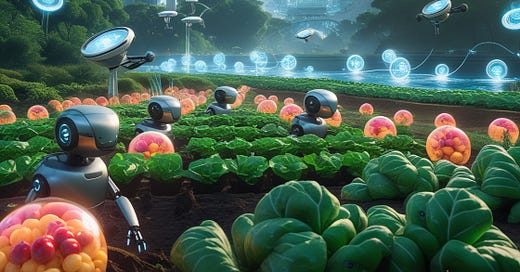What's next for healthtech, foodtech, and climatetech in 2025
Here's what we've learned from the Tech.eu Summit in March 2025
Welcome to our 1st event editorial, written with 🖤 by Darla Bautista, edited by Annika Bautista and Sarah Luna Mongin
What’s next for tech in sectors that shape our long-term survival ?
At this year’s Tech.eu Summit, some of the deepest, most pressing conversations sparked from 3 key sectors tackling systemic, high-stakes problems: health, food, and climate.
⚠️ 3 new missions for mission-critical sectors
These three sectors stood out for not only for being mission-critical, but for having shared traits, such as heavy regulation, rapidly changing and diverse mandates and increasing urgency.
Coming from the Tech.eu Summit’s startup pitches, we’re seeing clear investment shifts from each:
Healthtech 🏥 is entering AI 2.0, with employers and insurers seeking proactive, predictive solutions to improve outcomes
Foodtech 🥗 is navigating pressure from protectionist tariffs and rising input costs, along with growing stigma around the ‘green premium’
Climatetech ♻️ is shifting from net-zero focus towards resilience and adaptation, as EU regulations such as Corporate Sustainability Reporting Directive (CSRD) prompt companies to disclose and act
For VCs: this means asking the tough questions that go beyond headlines and hype.
Is the solution solving for ROI, long-term resilience, and scalability?
Does the startup have a clear, defensible edge, whether it’s in proprietary data or evidence-backed solutions?
Can this team actually get it into the hands of those who need it across the value chain?
Let’s deep dive into what’s hot, what’s being built, and what questions VCs should ask when evaluating deals in these sectors. 🔥
🧬 Healthtech
What’s hot 🔥
Maximising data → Startups are tapping into insurance claims and real-world health data to power predictive analytics that flag risks early
Delivering tangible solutions → The new wave of AI in health is focused on reducing costs and improving outcomes, not just clinical insight
Scaling with employers → As payers look for distribution at scale, employer-sponsored programs are emerging as a key go-to-market path
The innovators 🚀
Startups like Thier use ML to analyse insurance data and flag lifestyle-related chronic conditions like obesity early on. They pitched how next-level analysis guides employers to invest in the right health initiatives for their employees’ future. This turns employers from just reactive health insurers to proactive actors. 👌
3️⃣ factors VCs should evaluate
🧠 Moat: What’s the startup’s edge? Is it distribution, proprietary data, or evidence-based outcome improvement?
🧠 Regulatory alignment: What (if any) is the company’s pathway for regulatory approval with a notified body? What clinical or behavioral validation exists to support product efficacy (e.g., published studies, clinical trials, real-world data)?
🧠 Go-to-market: What is the roadmap for acquiring trust and adoption (e.g., partnerships with providers, direct-to-consumer distribution, or insurance channels)? What is the typical sales cycle?
🌾 Foodtech
What’s hot 🔥
Doing more with less resources → Technologies that are less dependent on labor/water/energy/fertiliser, or make it faster to go from farm to shelf
Innovating for the bottom-line → Capex-light, scalable solutions with fast paths to profitability
Evaluating long-term feasibility → Solutions that shift away from flashy “future food” hype to sustainable food ecosystem infrastructure
The innovators 🚀
Startups, such as Arborea, stand out for sustainable methods of producing healthy food and breathable oxygen simultaneously. Their current focus is investing in technoeconomic validation facilities to prove ROI at scale.
On the investment side, firms like Clay Capital back companies blending regenerative approaches with solid financials. Novelty alone won’t cut it.
3️⃣ factors VCs should evaluate
🌱 Financial benefits: Does the solution’s novelty come together with an operational plan that generates ROI across the value chain? How does the solution materially improve margins for food manufacturers, suppliers, or retailers (e.g., cost reduction, automation, shelf-life extension)?
🌱 Scalability and integration: How scalable is the product across different supply chain tiers (e.g., can it support multi-site operations or international rollouts without deep customisation), and what is the level of existing enterprise interest to adopt the solution?
🌱 Long-term play: How does the solution build into a longer term roadmap towards a sustainable food ecosystem?
🌍 Climatetech
What’s hot 🔥
Preserving critical infrastructure → AI and robotics for grid, infrastructure, and building preservation and overall safety
Preparing with greater resilience → Solutions that have adaptation benefits, beyond emissions reduction
Planning smarter → Tools to demonstrate asset-level climate risk and enable better capital planning
The innovators 🚀
Companies like Climate X and Sees.ai are building tools that help businesses quantify future risks and maintain critical infrastructure. This turns climate response into actual capex and resilience strategy planning. They advocate faster, quantified risk assessments, so enterprise customers can focus on preserving their infrastructure instead of losing time on analysis.
3️⃣ factors VCs should evaluate
🌍 Commercial positioning: Does the startup position the solution as a strategic advantage for enterprise clients or is the solution stuck as an ESG reporting cost-centre?
🌍 Incentive eligibility: Does the startup’s offering align with the EU Taxonomy for Sustainable Activities and qualify for regulatory incentives or funding (e.g., Innovation Fund, Horizon Europe)?
🌍 Regulatory alignment: Is the climate impact measurable, reportable, and verifiable with credible MRV standards (e.g., Gold Standard, Verra)?
🔁 Dig deeper
💛 If you liked this article, here are some resources to go deeper into these mission-critical sectors:
baby vc Health Deep Dive — check our “Deep Dives” tab for more!
You can also read more about baby vc on our website and follow our updates on LinkedIn, or directly reach out to us at hello@baby-vc.co! 🤝
👉 If you’re someone who attends tech events in Europe, don’t hesitate to reach out and write a piece with us 💛
The whole baby vc crew 🖤



